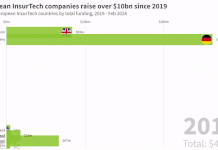Several small business owners have criticised Starling Bank for its handling of the governmental coronavirus relief loans scheme and now the challenger bank founder has responded to the criticism.
People being angry on social media platforms is nothing new, especially when they don’t get the service they think they deserve. In the past, Revolut, Robinhood and the Royal Bank of Scotland have all experienced this fact whenever their digital services have been down. So it’s hardly surprising that feelings ran hot when sole traders and other small business owners were rejected for government-backed business loans that they thought they were eligible for and that they relied on to save their companies from going under because of COVID-19.
Starling Bank, the UK-based challenger bank, has had to experience this first hand over the weekend after it declined about 2,900 business owners who had applied for a loan under the British government’s Bounce Back Loan Scheme (BBLS). The digital lender has signed up to the scheme, meaning it can offer SMEs term loans of between ?2,000 and ?50,000 if those small businesses are struggling financially because of the pandemic.
The neobank started to accept applications for the scheme on Monday May 11. Since then,? the digital lender has received 18,161 applications and processed 75% of them. Of those, 62% of decisions were made within 24 hours, 84% of decisions were made within 48 hours, 99.8% of decisions were made within 96 hours, and 94% of customers were paid within 24 hours of Starling receiving electronically signed documents.
While the neobank has so far paid out ?288m to small business owners through the scheme, 16% have been declined. ?The decision to decline these applications was not taken lightly,Anne Boden, CEO and founder of Starling Bank, said in a statement.
She added that many sole traders were rejected on Friday after several days of considerations as the bank decided what the best course of action was. Boden said that key to the decision was that businesses could not apply for a loan under the scheme with another bank while they were still being processed ?and therefore, we felt we should decline as quickly as possible all applications that we were unlikely to accept.p>
?The British Business Bank was advised on Friday morning about our plan to decline these applications and it accepted this position,Boden said. ?HM Treasury has also been advised.p>
The decision has caused a furore on social media where many of the rejected would-be loan takers or people still waiting for approval have been quick to vent their frustration.
“[You] are like the ice cream man with his chimes on, only to find out he’s got no Mr Whippy to sell only ice pops but to get the ice pop you have to sing the National Anthem backwards. Then he tells you he’s ran out of ice pops,” one rejected business owner wrote on Twitter.
A business owner parent also tweeted, ?I’ve recommended you a lot over the [years and] these loans are 100% [government] backed and should be a lifeline to all new microbusiness like my [daughter], some of which haven’t submitted their [first] tax [return] yet but can prove all cancellations and future bookings. [Please] sort this out.p>
A third complained, “Declined [and] no reason given. Doesnt help with applying elsewhere by not knowing the reason of being declined.”
On the back of this wave of criticism, Boden has issued a statement saying that there ?are some misconceptions about the scheme and I would like to put the record straight here.p>
She continued by stating, ?The Scheme was set up between the country biggest banks and the government through an organisation called the British Business Bank. The intention was to get loans into the hands of small businesses quickly.
?Starling did not have to join the scheme. However we were really keen to become part of it because we knew many of our customers needed help and we wanted them to benefit from low interest loans. Starling was accredited and, because of the head start that the country biggest banks had, entered the scheme a week later than these other banks.”
Boden explained that the while the scheme may be backed by the government, the loans granted or declined are just that loans. ?These are loans to businesses for business purposes,she said. ?They are ordinary bank loans made from a bank own funds but with a guarantee from the government to repay the bank if the customer does not repay.? Nevertheless, the bank is expected to pursue appropriate recovery processes in line with its existing standards if the loan is not repaid. People failing to repay a loan will have that recorded against their credit file, which could impact their future access to credit.p>
Several of the detractors online have wondered why Starling has made credit checks even though the government has said that banks essentially does not have to conduct any credit checks. But Boden said that the bank is not forbidden to conduct credit checks for these loans.
?This does not mean that the bank agrees not to perform credit or affordability checks,she argued. ?Rather, it means that the customer is allowing the bank to lend without completing these checks. Under the terms of the government guarantee, the decision to lend or not lend rests with the bank and it can apply credit or affordability checks if it feels this is appropriate.p>
She continued that Starling Bank usually conduct a soft credit check as part of its anti-fraud procedures. When checking the background of a customer as part of its know your customer (KYC) checks, the neobank ?noticed that a high proportion [of sole traders] fell into a high credit risk category, for example, they had either no credit record or a very poor credit record, a high level of borrowing and/or extended credit facilities and/or had failed to make repayments on some of these.p>
She continued, ?On Friday evening, we decided to decline applications from sole traders in higher credit risk categories. We believe that it not responsible to offer a loan to self-employed individuals when we believe there is a high likelihood of them being unable to repay. With BBLS, even though we, as a bank, should eventually get the money back from the government guarantee in the event of a default, the borrower is not similarly protected and will have a default registered on their credit file if theyre unable to repay.p>
Copyright ? 2020 FinTech Global











